Agency Relationship: Authority, Elements, and Case Law Analysis
VerifiedAdded on 2023/01/19
|9
|3045
|72
Report
AI Summary
This report provides a comprehensive overview of agency relationships, defining the concept as a fiduciary arrangement where a principal grants an agent authority to act on their behalf. It explores the features of agency relationships, highlighting the responsibilities of both the principal and the agent, and the different ways these relationships can be established. The report delves into the types of agent authority, with a detailed examination of actual authority (express and implied) and apparent authority (also known as ostensible authority). The core of the report focuses on the definition and essential elements of apparent authority, including representation, reliance, and the role of the principal. It uses a car sales example to illustrate apparent authority. Finally, the report concludes with a case law example to demonstrate the practical application of agency principles.
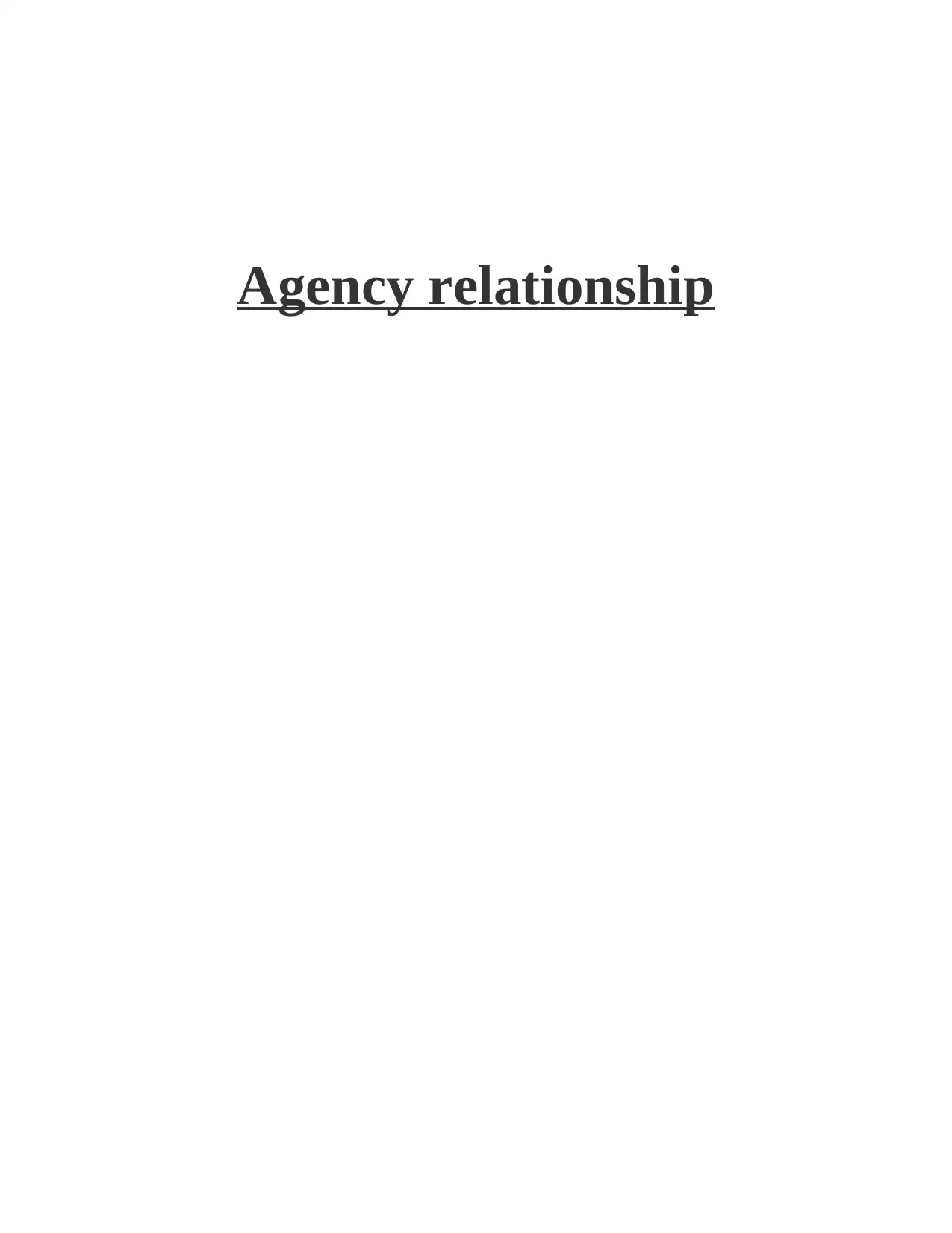
Agency relationship
Paraphrase This Document
Need a fresh take? Get an instant paraphrase of this document with our AI Paraphraser
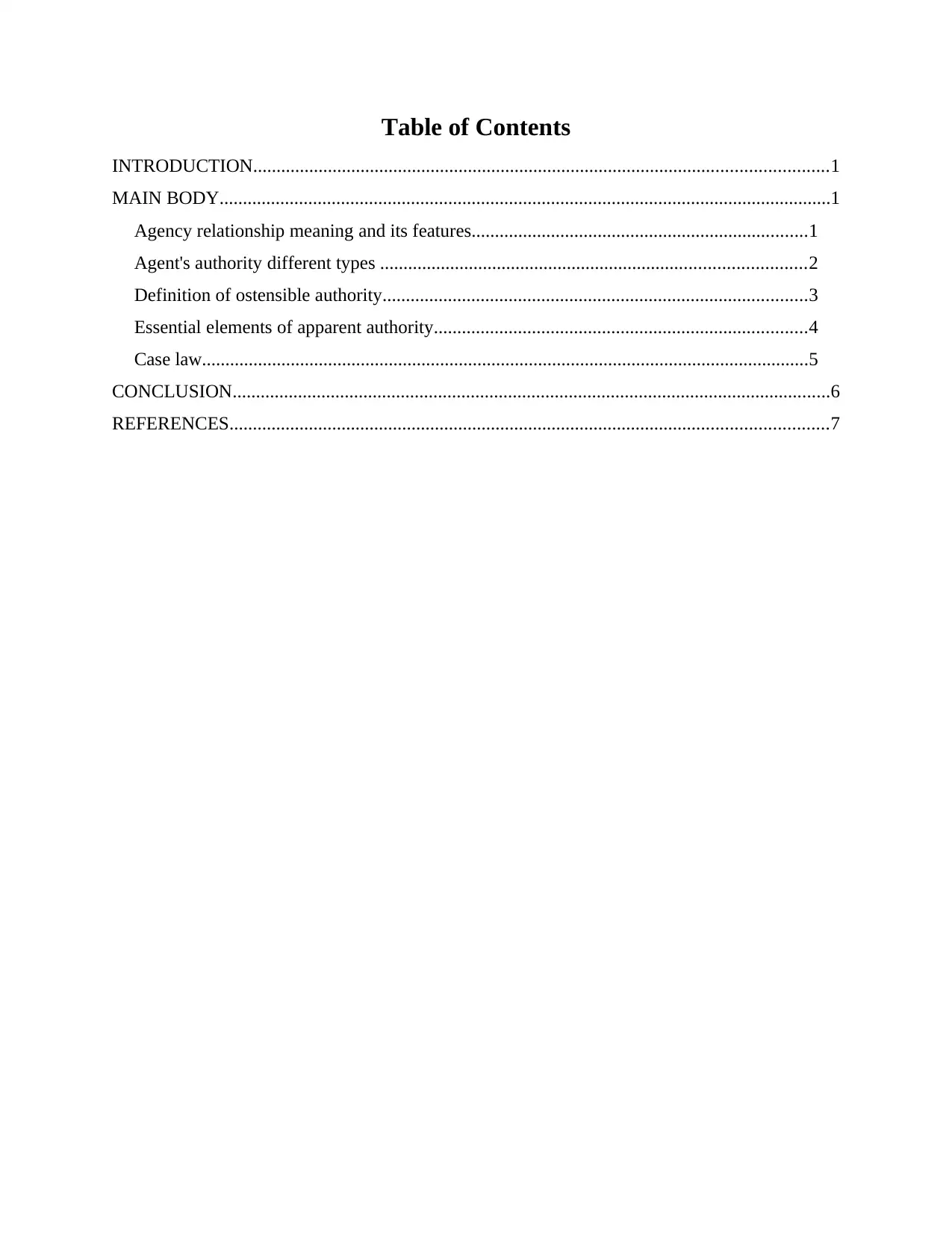
Table of Contents
INTRODUCTION...........................................................................................................................1
MAIN BODY...................................................................................................................................1
Agency relationship meaning and its features........................................................................1
Agent's authority different types ...........................................................................................2
Definition of ostensible authority...........................................................................................3
Essential elements of apparent authority................................................................................4
Case law..................................................................................................................................5
CONCLUSION................................................................................................................................6
REFERENCES................................................................................................................................7
INTRODUCTION...........................................................................................................................1
MAIN BODY...................................................................................................................................1
Agency relationship meaning and its features........................................................................1
Agent's authority different types ...........................................................................................2
Definition of ostensible authority...........................................................................................3
Essential elements of apparent authority................................................................................4
Case law..................................................................................................................................5
CONCLUSION................................................................................................................................6
REFERENCES................................................................................................................................7
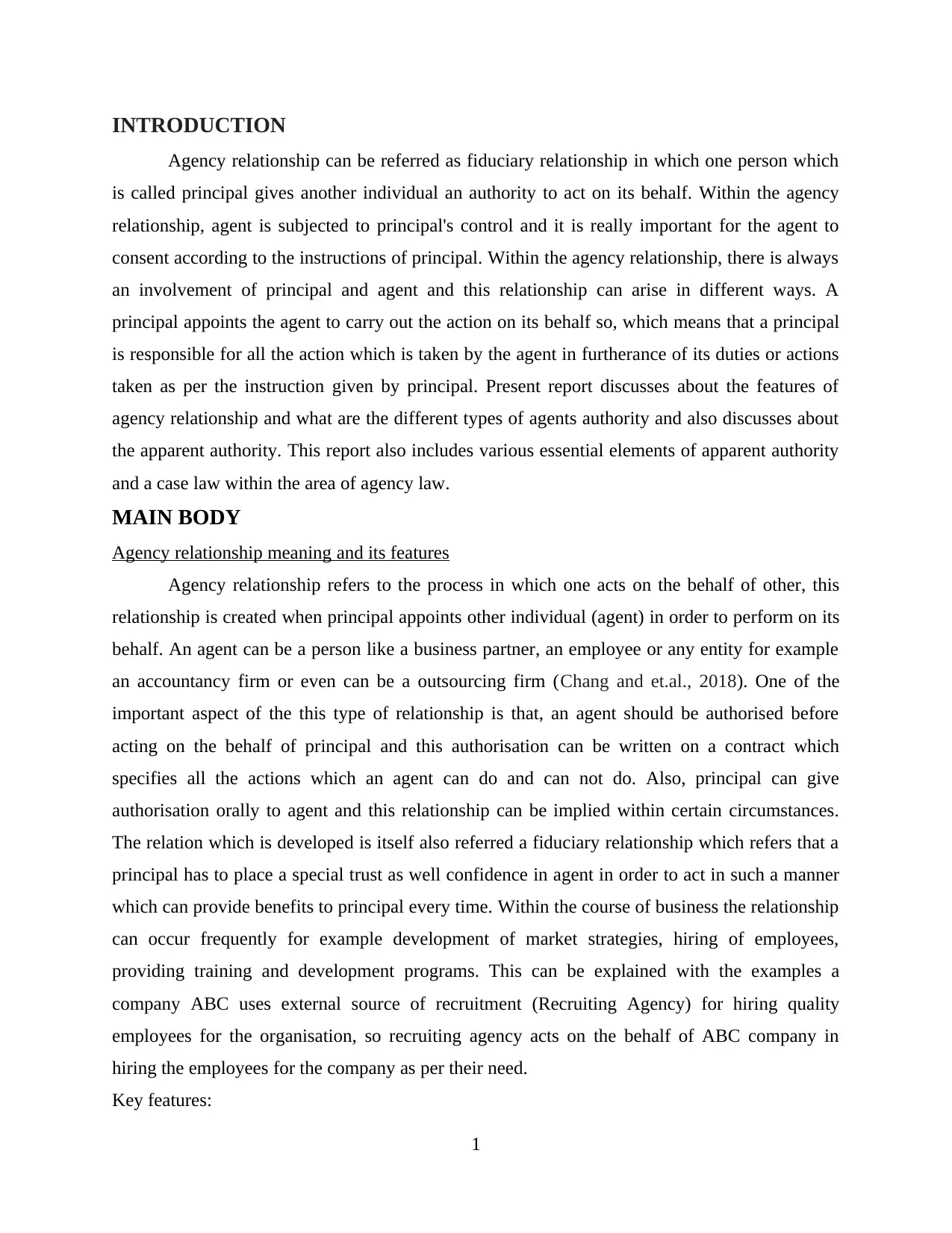
INTRODUCTION
Agency relationship can be referred as fiduciary relationship in which one person which
is called principal gives another individual an authority to act on its behalf. Within the agency
relationship, agent is subjected to principal's control and it is really important for the agent to
consent according to the instructions of principal. Within the agency relationship, there is always
an involvement of principal and agent and this relationship can arise in different ways. A
principal appoints the agent to carry out the action on its behalf so, which means that a principal
is responsible for all the action which is taken by the agent in furtherance of its duties or actions
taken as per the instruction given by principal. Present report discusses about the features of
agency relationship and what are the different types of agents authority and also discusses about
the apparent authority. This report also includes various essential elements of apparent authority
and a case law within the area of agency law.
MAIN BODY
Agency relationship meaning and its features
Agency relationship refers to the process in which one acts on the behalf of other, this
relationship is created when principal appoints other individual (agent) in order to perform on its
behalf. An agent can be a person like a business partner, an employee or any entity for example
an accountancy firm or even can be a outsourcing firm (Chang and et.al., 2018). One of the
important aspect of the this type of relationship is that, an agent should be authorised before
acting on the behalf of principal and this authorisation can be written on a contract which
specifies all the actions which an agent can do and can not do. Also, principal can give
authorisation orally to agent and this relationship can be implied within certain circumstances.
The relation which is developed is itself also referred a fiduciary relationship which refers that a
principal has to place a special trust as well confidence in agent in order to act in such a manner
which can provide benefits to principal every time. Within the course of business the relationship
can occur frequently for example development of market strategies, hiring of employees,
providing training and development programs. This can be explained with the examples a
company ABC uses external source of recruitment (Recruiting Agency) for hiring quality
employees for the organisation, so recruiting agency acts on the behalf of ABC company in
hiring the employees for the company as per their need.
Key features:
1
Agency relationship can be referred as fiduciary relationship in which one person which
is called principal gives another individual an authority to act on its behalf. Within the agency
relationship, agent is subjected to principal's control and it is really important for the agent to
consent according to the instructions of principal. Within the agency relationship, there is always
an involvement of principal and agent and this relationship can arise in different ways. A
principal appoints the agent to carry out the action on its behalf so, which means that a principal
is responsible for all the action which is taken by the agent in furtherance of its duties or actions
taken as per the instruction given by principal. Present report discusses about the features of
agency relationship and what are the different types of agents authority and also discusses about
the apparent authority. This report also includes various essential elements of apparent authority
and a case law within the area of agency law.
MAIN BODY
Agency relationship meaning and its features
Agency relationship refers to the process in which one acts on the behalf of other, this
relationship is created when principal appoints other individual (agent) in order to perform on its
behalf. An agent can be a person like a business partner, an employee or any entity for example
an accountancy firm or even can be a outsourcing firm (Chang and et.al., 2018). One of the
important aspect of the this type of relationship is that, an agent should be authorised before
acting on the behalf of principal and this authorisation can be written on a contract which
specifies all the actions which an agent can do and can not do. Also, principal can give
authorisation orally to agent and this relationship can be implied within certain circumstances.
The relation which is developed is itself also referred a fiduciary relationship which refers that a
principal has to place a special trust as well confidence in agent in order to act in such a manner
which can provide benefits to principal every time. Within the course of business the relationship
can occur frequently for example development of market strategies, hiring of employees,
providing training and development programs. This can be explained with the examples a
company ABC uses external source of recruitment (Recruiting Agency) for hiring quality
employees for the organisation, so recruiting agency acts on the behalf of ABC company in
hiring the employees for the company as per their need.
Key features:
1
⊘ This is a preview!⊘
Do you want full access?
Subscribe today to unlock all pages.

Trusted by 1+ million students worldwide
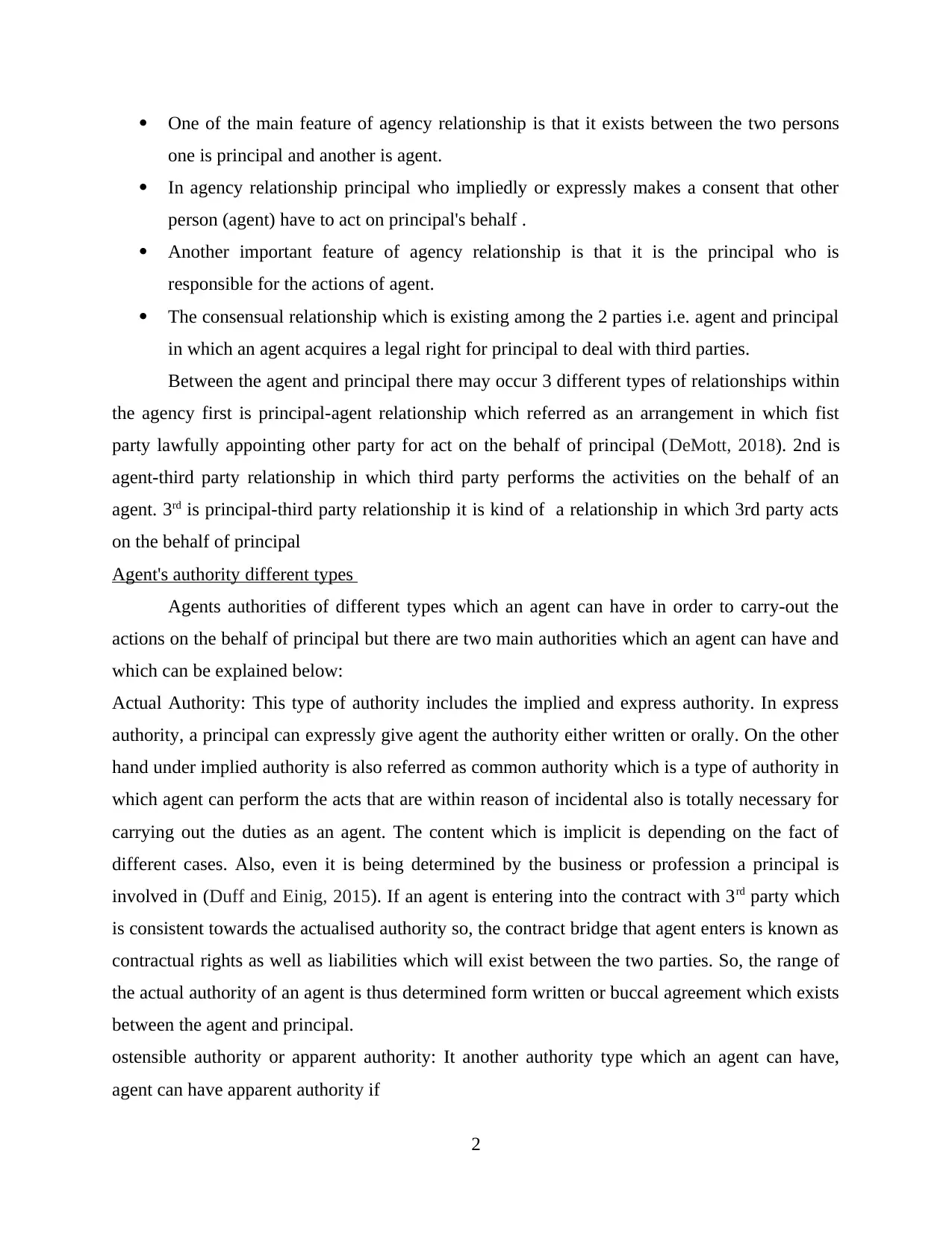
One of the main feature of agency relationship is that it exists between the two persons
one is principal and another is agent.
In agency relationship principal who impliedly or expressly makes a consent that other
person (agent) have to act on principal's behalf .
Another important feature of agency relationship is that it is the principal who is
responsible for the actions of agent.
The consensual relationship which is existing among the 2 parties i.e. agent and principal
in which an agent acquires a legal right for principal to deal with third parties.
Between the agent and principal there may occur 3 different types of relationships within
the agency first is principal-agent relationship which referred as an arrangement in which fist
party lawfully appointing other party for act on the behalf of principal (DeMott, 2018). 2nd is
agent-third party relationship in which third party performs the activities on the behalf of an
agent. 3rd is principal-third party relationship it is kind of a relationship in which 3rd party acts
on the behalf of principal
Agent's authority different types
Agents authorities of different types which an agent can have in order to carry-out the
actions on the behalf of principal but there are two main authorities which an agent can have and
which can be explained below:
Actual Authority: This type of authority includes the implied and express authority. In express
authority, a principal can expressly give agent the authority either written or orally. On the other
hand under implied authority is also referred as common authority which is a type of authority in
which agent can perform the acts that are within reason of incidental also is totally necessary for
carrying out the duties as an agent. The content which is implicit is depending on the fact of
different cases. Also, even it is being determined by the business or profession a principal is
involved in (Duff and Einig, 2015). If an agent is entering into the contract with 3rd party which
is consistent towards the actualised authority so, the contract bridge that agent enters is known as
contractual rights as well as liabilities which will exist between the two parties. So, the range of
the actual authority of an agent is thus determined form written or buccal agreement which exists
between the agent and principal.
ostensible authority or apparent authority: It another authority type which an agent can have,
agent can have apparent authority if
2
one is principal and another is agent.
In agency relationship principal who impliedly or expressly makes a consent that other
person (agent) have to act on principal's behalf .
Another important feature of agency relationship is that it is the principal who is
responsible for the actions of agent.
The consensual relationship which is existing among the 2 parties i.e. agent and principal
in which an agent acquires a legal right for principal to deal with third parties.
Between the agent and principal there may occur 3 different types of relationships within
the agency first is principal-agent relationship which referred as an arrangement in which fist
party lawfully appointing other party for act on the behalf of principal (DeMott, 2018). 2nd is
agent-third party relationship in which third party performs the activities on the behalf of an
agent. 3rd is principal-third party relationship it is kind of a relationship in which 3rd party acts
on the behalf of principal
Agent's authority different types
Agents authorities of different types which an agent can have in order to carry-out the
actions on the behalf of principal but there are two main authorities which an agent can have and
which can be explained below:
Actual Authority: This type of authority includes the implied and express authority. In express
authority, a principal can expressly give agent the authority either written or orally. On the other
hand under implied authority is also referred as common authority which is a type of authority in
which agent can perform the acts that are within reason of incidental also is totally necessary for
carrying out the duties as an agent. The content which is implicit is depending on the fact of
different cases. Also, even it is being determined by the business or profession a principal is
involved in (Duff and Einig, 2015). If an agent is entering into the contract with 3rd party which
is consistent towards the actualised authority so, the contract bridge that agent enters is known as
contractual rights as well as liabilities which will exist between the two parties. So, the range of
the actual authority of an agent is thus determined form written or buccal agreement which exists
between the agent and principal.
ostensible authority or apparent authority: It another authority type which an agent can have,
agent can have apparent authority if
2
Paraphrase This Document
Need a fresh take? Get an instant paraphrase of this document with our AI Paraphraser
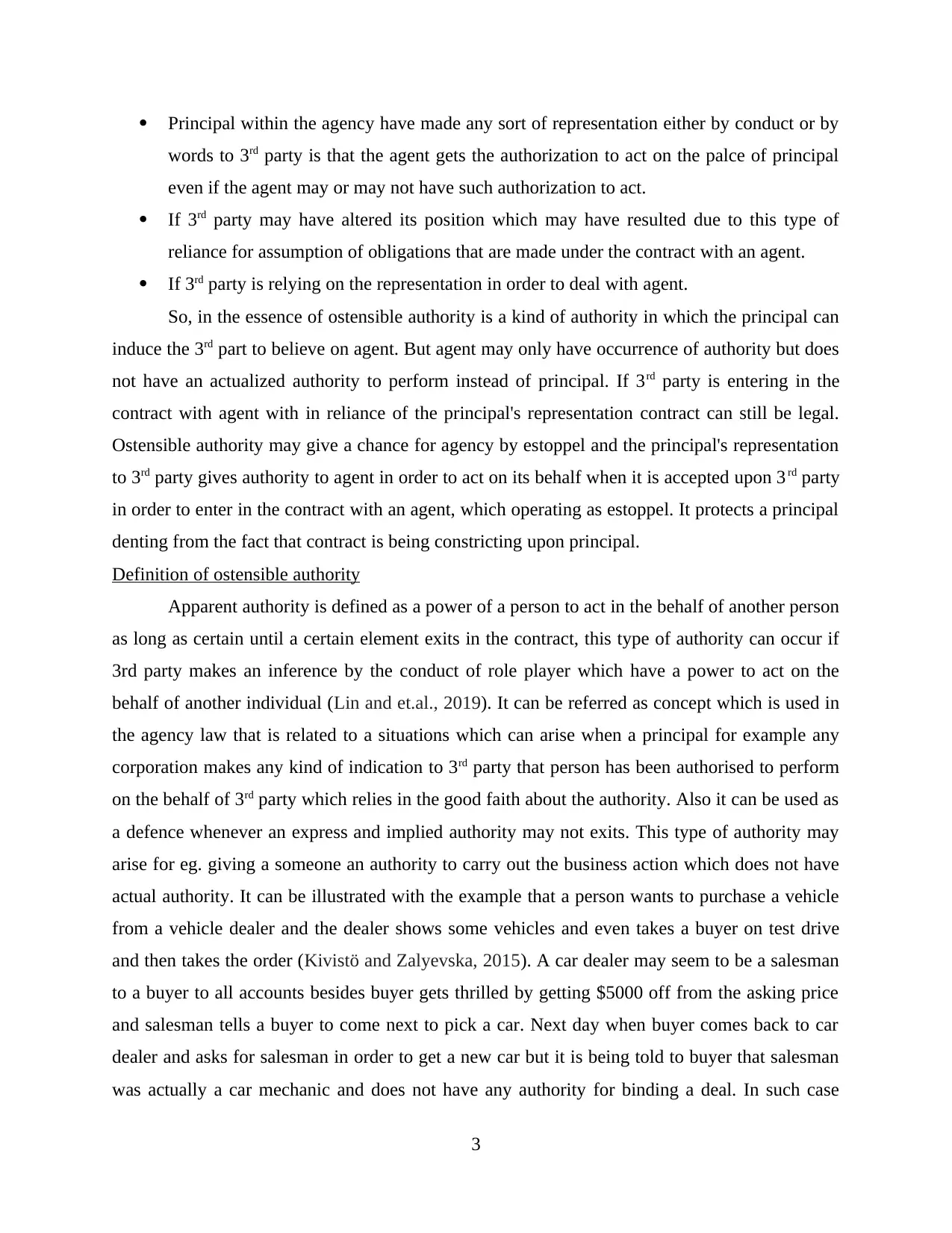
Principal within the agency have made any sort of representation either by conduct or by
words to 3rd party is that the agent gets the authorization to act on the palce of principal
even if the agent may or may not have such authorization to act.
If 3rd party may have altered its position which may have resulted due to this type of
reliance for assumption of obligations that are made under the contract with an agent.
If 3rd party is relying on the representation in order to deal with agent.
So, in the essence of ostensible authority is a kind of authority in which the principal can
induce the 3rd part to believe on agent. But agent may only have occurrence of authority but does
not have an actualized authority to perform instead of principal. If 3rd party is entering in the
contract with agent with in reliance of the principal's representation contract can still be legal.
Ostensible authority may give a chance for agency by estoppel and the principal's representation
to 3rd party gives authority to agent in order to act on its behalf when it is accepted upon 3 rd party
in order to enter in the contract with an agent, which operating as estoppel. It protects a principal
denting from the fact that contract is being constricting upon principal.
Definition of ostensible authority
Apparent authority is defined as a power of a person to act in the behalf of another person
as long as certain until a certain element exits in the contract, this type of authority can occur if
3rd party makes an inference by the conduct of role player which have a power to act on the
behalf of another individual (Lin and et.al., 2019). It can be referred as concept which is used in
the agency law that is related to a situations which can arise when a principal for example any
corporation makes any kind of indication to 3rd party that person has been authorised to perform
on the behalf of 3rd party which relies in the good faith about the authority. Also it can be used as
a defence whenever an express and implied authority may not exits. This type of authority may
arise for eg. giving a someone an authority to carry out the business action which does not have
actual authority. It can be illustrated with the example that a person wants to purchase a vehicle
from a vehicle dealer and the dealer shows some vehicles and even takes a buyer on test drive
and then takes the order (Kivistö and Zalyevska, 2015). A car dealer may seem to be a salesman
to a buyer to all accounts besides buyer gets thrilled by getting $5000 off from the asking price
and salesman tells a buyer to come next to pick a car. Next day when buyer comes back to car
dealer and asks for salesman in order to get a new car but it is being told to buyer that salesman
was actually a car mechanic and does not have any authority for binding a deal. In such case
3
words to 3rd party is that the agent gets the authorization to act on the palce of principal
even if the agent may or may not have such authorization to act.
If 3rd party may have altered its position which may have resulted due to this type of
reliance for assumption of obligations that are made under the contract with an agent.
If 3rd party is relying on the representation in order to deal with agent.
So, in the essence of ostensible authority is a kind of authority in which the principal can
induce the 3rd part to believe on agent. But agent may only have occurrence of authority but does
not have an actualized authority to perform instead of principal. If 3rd party is entering in the
contract with agent with in reliance of the principal's representation contract can still be legal.
Ostensible authority may give a chance for agency by estoppel and the principal's representation
to 3rd party gives authority to agent in order to act on its behalf when it is accepted upon 3 rd party
in order to enter in the contract with an agent, which operating as estoppel. It protects a principal
denting from the fact that contract is being constricting upon principal.
Definition of ostensible authority
Apparent authority is defined as a power of a person to act in the behalf of another person
as long as certain until a certain element exits in the contract, this type of authority can occur if
3rd party makes an inference by the conduct of role player which have a power to act on the
behalf of another individual (Lin and et.al., 2019). It can be referred as concept which is used in
the agency law that is related to a situations which can arise when a principal for example any
corporation makes any kind of indication to 3rd party that person has been authorised to perform
on the behalf of 3rd party which relies in the good faith about the authority. Also it can be used as
a defence whenever an express and implied authority may not exits. This type of authority may
arise for eg. giving a someone an authority to carry out the business action which does not have
actual authority. It can be illustrated with the example that a person wants to purchase a vehicle
from a vehicle dealer and the dealer shows some vehicles and even takes a buyer on test drive
and then takes the order (Kivistö and Zalyevska, 2015). A car dealer may seem to be a salesman
to a buyer to all accounts besides buyer gets thrilled by getting $5000 off from the asking price
and salesman tells a buyer to come next to pick a car. Next day when buyer comes back to car
dealer and asks for salesman in order to get a new car but it is being told to buyer that salesman
was actually a car mechanic and does not have any authority for binding a deal. In such case
3
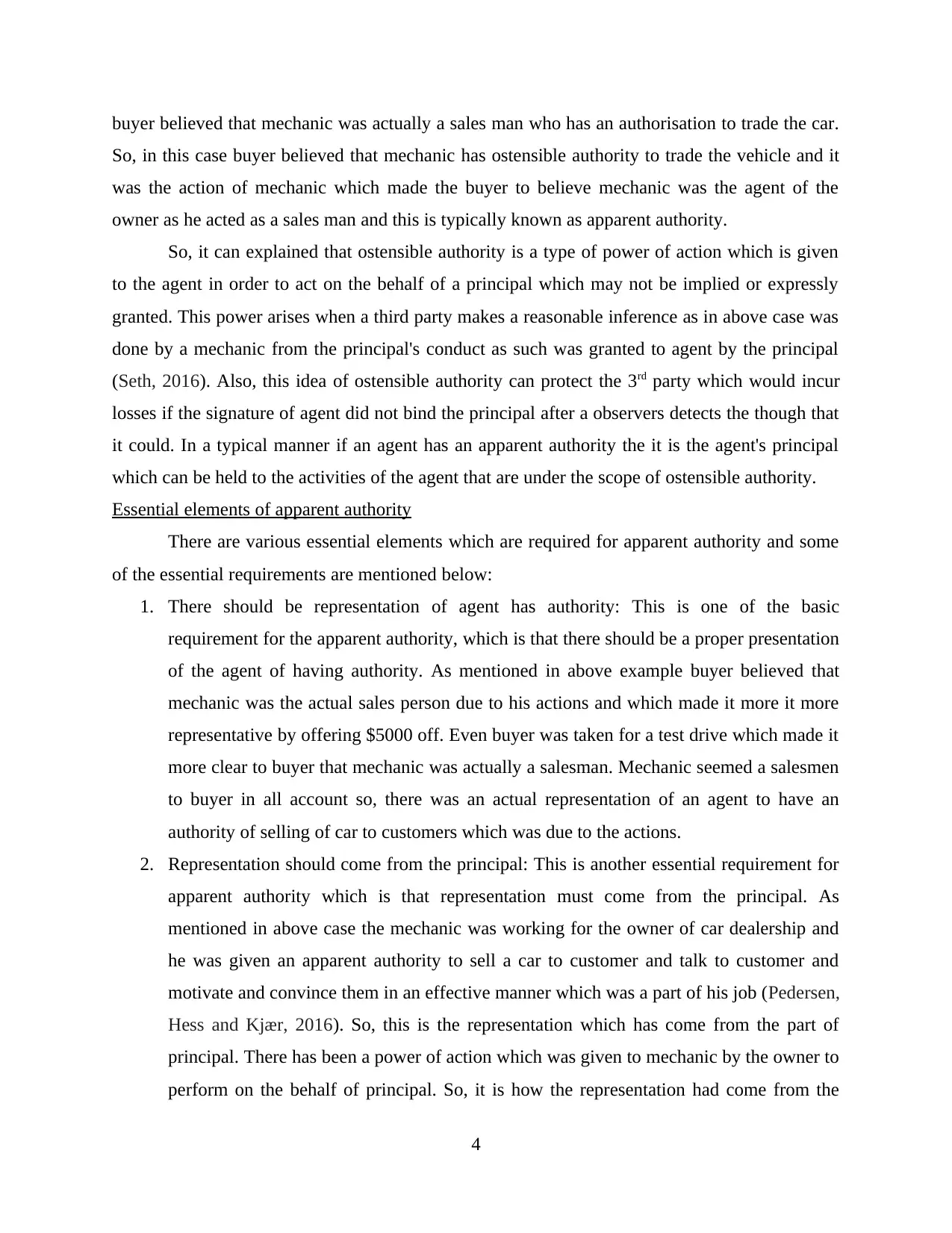
buyer believed that mechanic was actually a sales man who has an authorisation to trade the car.
So, in this case buyer believed that mechanic has ostensible authority to trade the vehicle and it
was the action of mechanic which made the buyer to believe mechanic was the agent of the
owner as he acted as a sales man and this is typically known as apparent authority.
So, it can explained that ostensible authority is a type of power of action which is given
to the agent in order to act on the behalf of a principal which may not be implied or expressly
granted. This power arises when a third party makes a reasonable inference as in above case was
done by a mechanic from the principal's conduct as such was granted to agent by the principal
(Seth, 2016). Also, this idea of ostensible authority can protect the 3rd party which would incur
losses if the signature of agent did not bind the principal after a observers detects the though that
it could. In a typical manner if an agent has an apparent authority the it is the agent's principal
which can be held to the activities of the agent that are under the scope of ostensible authority.
Essential elements of apparent authority
There are various essential elements which are required for apparent authority and some
of the essential requirements are mentioned below:
1. There should be representation of agent has authority: This is one of the basic
requirement for the apparent authority, which is that there should be a proper presentation
of the agent of having authority. As mentioned in above example buyer believed that
mechanic was the actual sales person due to his actions and which made it more it more
representative by offering $5000 off. Even buyer was taken for a test drive which made it
more clear to buyer that mechanic was actually a salesman. Mechanic seemed a salesmen
to buyer in all account so, there was an actual representation of an agent to have an
authority of selling of car to customers which was due to the actions.
2. Representation should come from the principal: This is another essential requirement for
apparent authority which is that representation must come from the principal. As
mentioned in above case the mechanic was working for the owner of car dealership and
he was given an apparent authority to sell a car to customer and talk to customer and
motivate and convince them in an effective manner which was a part of his job (Pedersen,
Hess and Kjær, 2016). So, this is the representation which has come from the part of
principal. There has been a power of action which was given to mechanic by the owner to
perform on the behalf of principal. So, it is how the representation had come from the
4
So, in this case buyer believed that mechanic has ostensible authority to trade the vehicle and it
was the action of mechanic which made the buyer to believe mechanic was the agent of the
owner as he acted as a sales man and this is typically known as apparent authority.
So, it can explained that ostensible authority is a type of power of action which is given
to the agent in order to act on the behalf of a principal which may not be implied or expressly
granted. This power arises when a third party makes a reasonable inference as in above case was
done by a mechanic from the principal's conduct as such was granted to agent by the principal
(Seth, 2016). Also, this idea of ostensible authority can protect the 3rd party which would incur
losses if the signature of agent did not bind the principal after a observers detects the though that
it could. In a typical manner if an agent has an apparent authority the it is the agent's principal
which can be held to the activities of the agent that are under the scope of ostensible authority.
Essential elements of apparent authority
There are various essential elements which are required for apparent authority and some
of the essential requirements are mentioned below:
1. There should be representation of agent has authority: This is one of the basic
requirement for the apparent authority, which is that there should be a proper presentation
of the agent of having authority. As mentioned in above example buyer believed that
mechanic was the actual sales person due to his actions and which made it more it more
representative by offering $5000 off. Even buyer was taken for a test drive which made it
more clear to buyer that mechanic was actually a salesman. Mechanic seemed a salesmen
to buyer in all account so, there was an actual representation of an agent to have an
authority of selling of car to customers which was due to the actions.
2. Representation should come from the principal: This is another essential requirement for
apparent authority which is that representation must come from the principal. As
mentioned in above case the mechanic was working for the owner of car dealership and
he was given an apparent authority to sell a car to customer and talk to customer and
motivate and convince them in an effective manner which was a part of his job (Pedersen,
Hess and Kjær, 2016). So, this is the representation which has come from the part of
principal. There has been a power of action which was given to mechanic by the owner to
perform on the behalf of principal. So, it is how the representation had come from the
4
⊘ This is a preview!⊘
Do you want full access?
Subscribe today to unlock all pages.

Trusted by 1+ million students worldwide
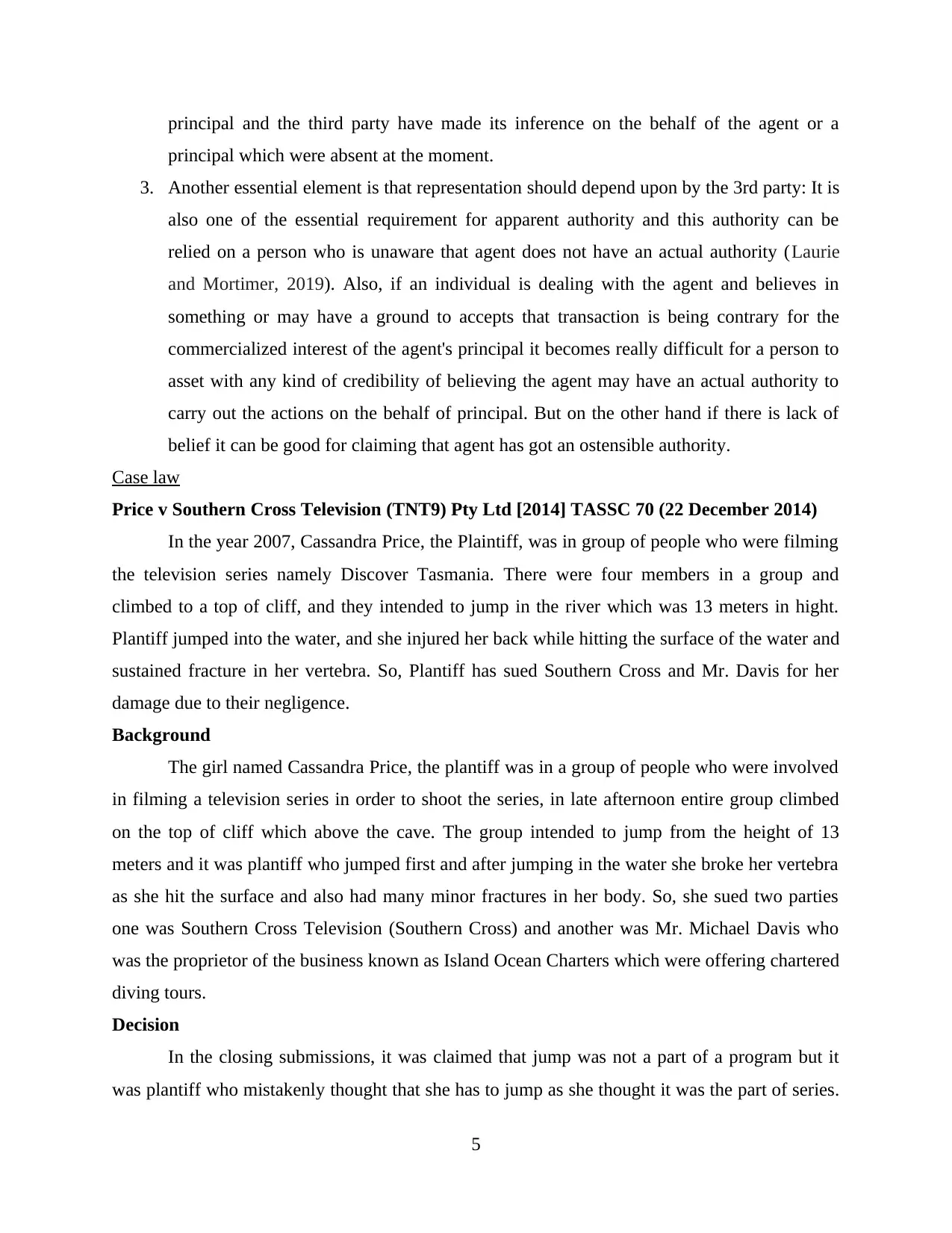
principal and the third party have made its inference on the behalf of the agent or a
principal which were absent at the moment.
3. Another essential element is that representation should depend upon by the 3rd party: It is
also one of the essential requirement for apparent authority and this authority can be
relied on a person who is unaware that agent does not have an actual authority (Laurie
and Mortimer, 2019). Also, if an individual is dealing with the agent and believes in
something or may have a ground to accepts that transaction is being contrary for the
commercialized interest of the agent's principal it becomes really difficult for a person to
asset with any kind of credibility of believing the agent may have an actual authority to
carry out the actions on the behalf of principal. But on the other hand if there is lack of
belief it can be good for claiming that agent has got an ostensible authority.
Case law
Price v Southern Cross Television (TNT9) Pty Ltd [2014] TASSC 70 (22 December 2014)
In the year 2007, Cassandra Price, the Plaintiff, was in group of people who were filming
the television series namely Discover Tasmania. There were four members in a group and
climbed to a top of cliff, and they intended to jump in the river which was 13 meters in hight.
Plantiff jumped into the water, and she injured her back while hitting the surface of the water and
sustained fracture in her vertebra. So, Plantiff has sued Southern Cross and Mr. Davis for her
damage due to their negligence.
Background
The girl named Cassandra Price, the plantiff was in a group of people who were involved
in filming a television series in order to shoot the series, in late afternoon entire group climbed
on the top of cliff which above the cave. The group intended to jump from the height of 13
meters and it was plantiff who jumped first and after jumping in the water she broke her vertebra
as she hit the surface and also had many minor fractures in her body. So, she sued two parties
one was Southern Cross Television (Southern Cross) and another was Mr. Michael Davis who
was the proprietor of the business known as Island Ocean Charters which were offering chartered
diving tours.
Decision
In the closing submissions, it was claimed that jump was not a part of a program but it
was plantiff who mistakenly thought that she has to jump as she thought it was the part of series.
5
principal which were absent at the moment.
3. Another essential element is that representation should depend upon by the 3rd party: It is
also one of the essential requirement for apparent authority and this authority can be
relied on a person who is unaware that agent does not have an actual authority (Laurie
and Mortimer, 2019). Also, if an individual is dealing with the agent and believes in
something or may have a ground to accepts that transaction is being contrary for the
commercialized interest of the agent's principal it becomes really difficult for a person to
asset with any kind of credibility of believing the agent may have an actual authority to
carry out the actions on the behalf of principal. But on the other hand if there is lack of
belief it can be good for claiming that agent has got an ostensible authority.
Case law
Price v Southern Cross Television (TNT9) Pty Ltd [2014] TASSC 70 (22 December 2014)
In the year 2007, Cassandra Price, the Plaintiff, was in group of people who were filming
the television series namely Discover Tasmania. There were four members in a group and
climbed to a top of cliff, and they intended to jump in the river which was 13 meters in hight.
Plantiff jumped into the water, and she injured her back while hitting the surface of the water and
sustained fracture in her vertebra. So, Plantiff has sued Southern Cross and Mr. Davis for her
damage due to their negligence.
Background
The girl named Cassandra Price, the plantiff was in a group of people who were involved
in filming a television series in order to shoot the series, in late afternoon entire group climbed
on the top of cliff which above the cave. The group intended to jump from the height of 13
meters and it was plantiff who jumped first and after jumping in the water she broke her vertebra
as she hit the surface and also had many minor fractures in her body. So, she sued two parties
one was Southern Cross Television (Southern Cross) and another was Mr. Michael Davis who
was the proprietor of the business known as Island Ocean Charters which were offering chartered
diving tours.
Decision
In the closing submissions, it was claimed that jump was not a part of a program but it
was plantiff who mistakenly thought that she has to jump as she thought it was the part of series.
5
Paraphrase This Document
Need a fresh take? Get an instant paraphrase of this document with our AI Paraphraser
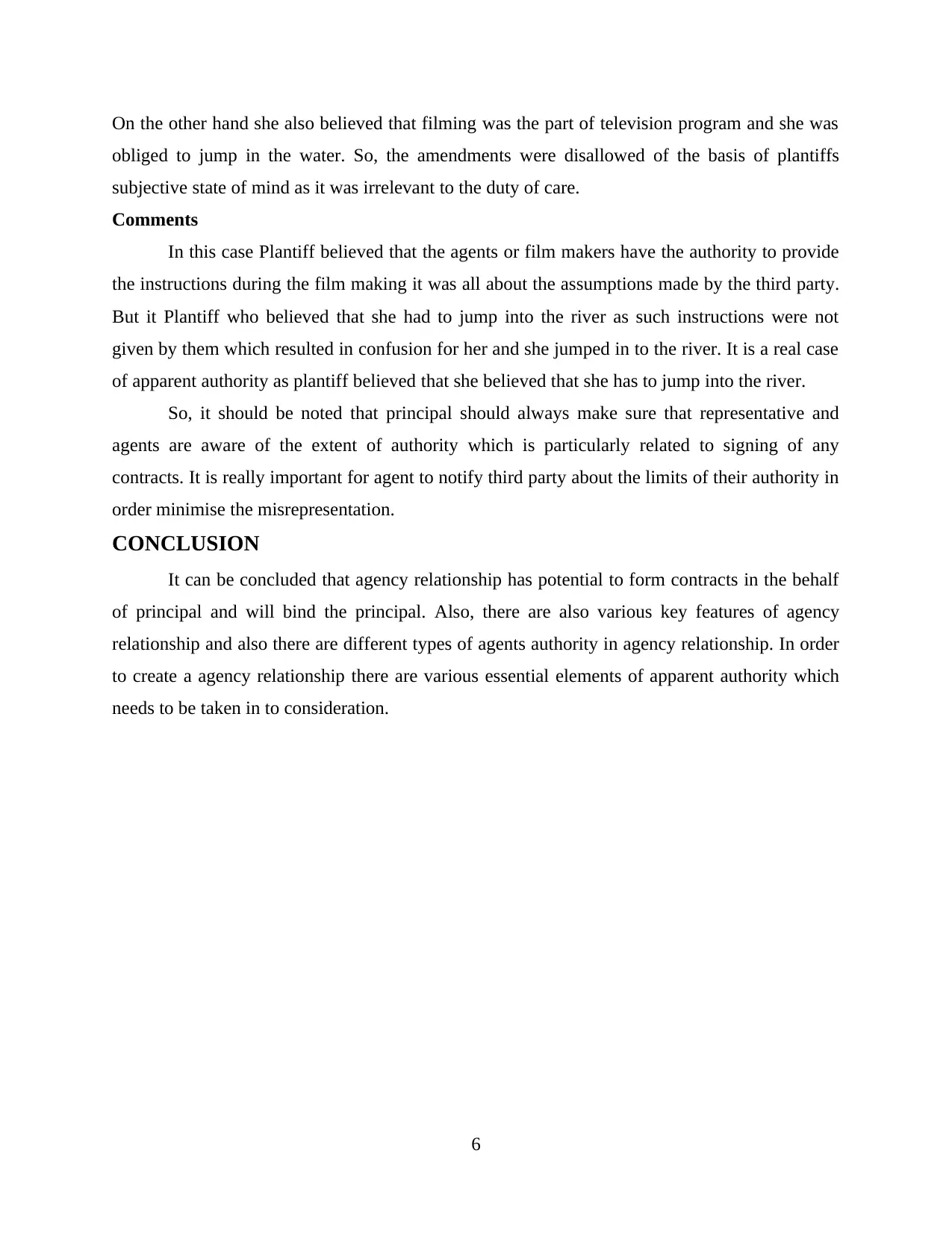
On the other hand she also believed that filming was the part of television program and she was
obliged to jump in the water. So, the amendments were disallowed of the basis of plantiffs
subjective state of mind as it was irrelevant to the duty of care.
Comments
In this case Plantiff believed that the agents or film makers have the authority to provide
the instructions during the film making it was all about the assumptions made by the third party.
But it Plantiff who believed that she had to jump into the river as such instructions were not
given by them which resulted in confusion for her and she jumped in to the river. It is a real case
of apparent authority as plantiff believed that she believed that she has to jump into the river.
So, it should be noted that principal should always make sure that representative and
agents are aware of the extent of authority which is particularly related to signing of any
contracts. It is really important for agent to notify third party about the limits of their authority in
order minimise the misrepresentation.
CONCLUSION
It can be concluded that agency relationship has potential to form contracts in the behalf
of principal and will bind the principal. Also, there are also various key features of agency
relationship and also there are different types of agents authority in agency relationship. In order
to create a agency relationship there are various essential elements of apparent authority which
needs to be taken in to consideration.
6
obliged to jump in the water. So, the amendments were disallowed of the basis of plantiffs
subjective state of mind as it was irrelevant to the duty of care.
Comments
In this case Plantiff believed that the agents or film makers have the authority to provide
the instructions during the film making it was all about the assumptions made by the third party.
But it Plantiff who believed that she had to jump into the river as such instructions were not
given by them which resulted in confusion for her and she jumped in to the river. It is a real case
of apparent authority as plantiff believed that she believed that she has to jump into the river.
So, it should be noted that principal should always make sure that representative and
agents are aware of the extent of authority which is particularly related to signing of any
contracts. It is really important for agent to notify third party about the limits of their authority in
order minimise the misrepresentation.
CONCLUSION
It can be concluded that agency relationship has potential to form contracts in the behalf
of principal and will bind the principal. Also, there are also various key features of agency
relationship and also there are different types of agents authority in agency relationship. In order
to create a agency relationship there are various essential elements of apparent authority which
needs to be taken in to consideration.
6
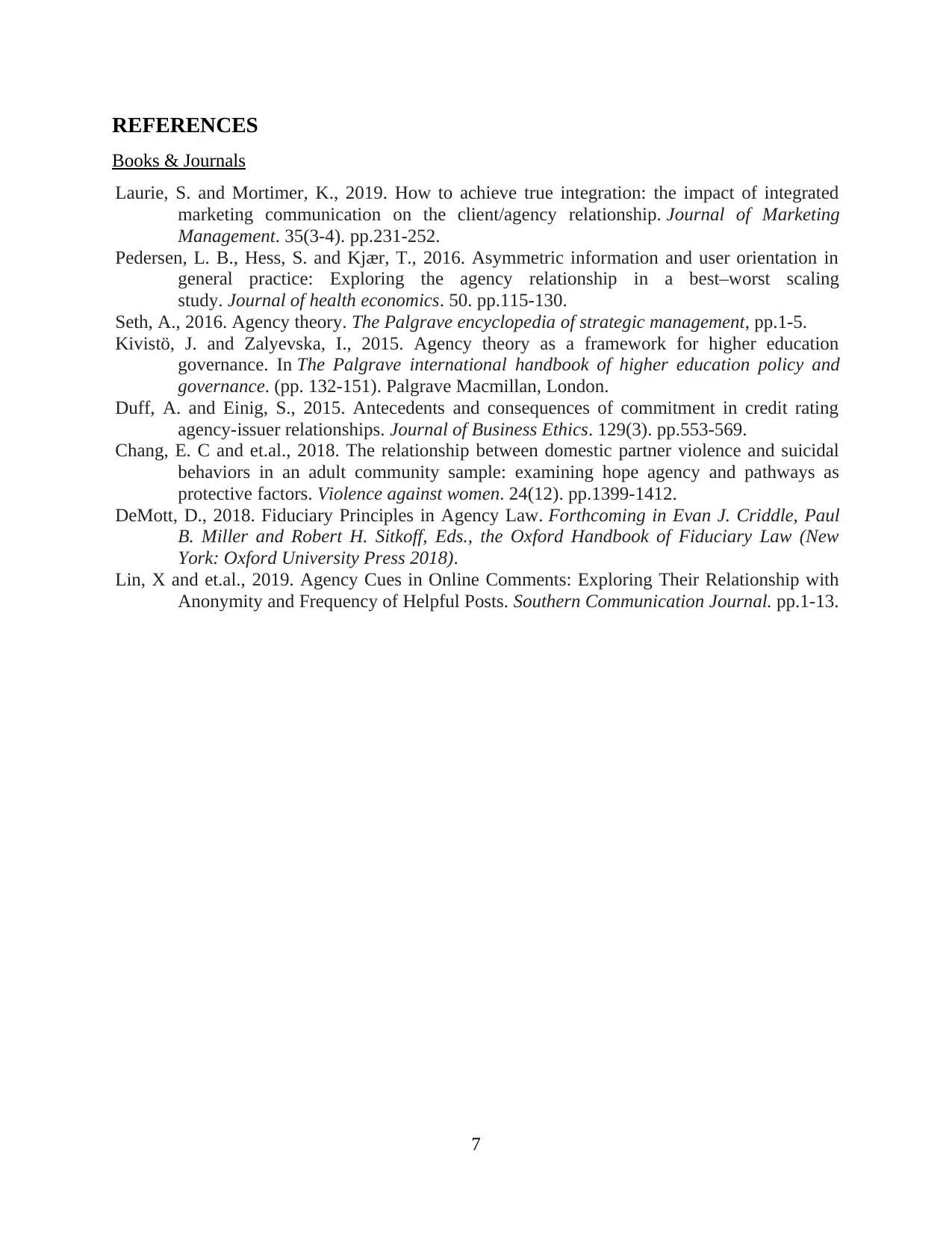
REFERENCES
Books & Journals
Laurie, S. and Mortimer, K., 2019. How to achieve true integration: the impact of integrated
marketing communication on the client/agency relationship. Journal of Marketing
Management. 35(3-4). pp.231-252.
Pedersen, L. B., Hess, S. and Kjær, T., 2016. Asymmetric information and user orientation in
general practice: Exploring the agency relationship in a best–worst scaling
study. Journal of health economics. 50. pp.115-130.
Seth, A., 2016. Agency theory. The Palgrave encyclopedia of strategic management, pp.1-5.
Kivistö, J. and Zalyevska, I., 2015. Agency theory as a framework for higher education
governance. In The Palgrave international handbook of higher education policy and
governance. (pp. 132-151). Palgrave Macmillan, London.
Duff, A. and Einig, S., 2015. Antecedents and consequences of commitment in credit rating
agency-issuer relationships. Journal of Business Ethics. 129(3). pp.553-569.
Chang, E. C and et.al., 2018. The relationship between domestic partner violence and suicidal
behaviors in an adult community sample: examining hope agency and pathways as
protective factors. Violence against women. 24(12). pp.1399-1412.
DeMott, D., 2018. Fiduciary Principles in Agency Law. Forthcoming in Evan J. Criddle, Paul
B. Miller and Robert H. Sitkoff, Eds., the Oxford Handbook of Fiduciary Law (New
York: Oxford University Press 2018).
Lin, X and et.al., 2019. Agency Cues in Online Comments: Exploring Their Relationship with
Anonymity and Frequency of Helpful Posts. Southern Communication Journal. pp.1-13.
7
Books & Journals
Laurie, S. and Mortimer, K., 2019. How to achieve true integration: the impact of integrated
marketing communication on the client/agency relationship. Journal of Marketing
Management. 35(3-4). pp.231-252.
Pedersen, L. B., Hess, S. and Kjær, T., 2016. Asymmetric information and user orientation in
general practice: Exploring the agency relationship in a best–worst scaling
study. Journal of health economics. 50. pp.115-130.
Seth, A., 2016. Agency theory. The Palgrave encyclopedia of strategic management, pp.1-5.
Kivistö, J. and Zalyevska, I., 2015. Agency theory as a framework for higher education
governance. In The Palgrave international handbook of higher education policy and
governance. (pp. 132-151). Palgrave Macmillan, London.
Duff, A. and Einig, S., 2015. Antecedents and consequences of commitment in credit rating
agency-issuer relationships. Journal of Business Ethics. 129(3). pp.553-569.
Chang, E. C and et.al., 2018. The relationship between domestic partner violence and suicidal
behaviors in an adult community sample: examining hope agency and pathways as
protective factors. Violence against women. 24(12). pp.1399-1412.
DeMott, D., 2018. Fiduciary Principles in Agency Law. Forthcoming in Evan J. Criddle, Paul
B. Miller and Robert H. Sitkoff, Eds., the Oxford Handbook of Fiduciary Law (New
York: Oxford University Press 2018).
Lin, X and et.al., 2019. Agency Cues in Online Comments: Exploring Their Relationship with
Anonymity and Frequency of Helpful Posts. Southern Communication Journal. pp.1-13.
7
⊘ This is a preview!⊘
Do you want full access?
Subscribe today to unlock all pages.

Trusted by 1+ million students worldwide
1 out of 9
Related Documents
Your All-in-One AI-Powered Toolkit for Academic Success.
+13062052269
info@desklib.com
Available 24*7 on WhatsApp / Email
![[object Object]](/_next/static/media/star-bottom.7253800d.svg)
Unlock your academic potential
Copyright © 2020–2026 A2Z Services. All Rights Reserved. Developed and managed by ZUCOL.




